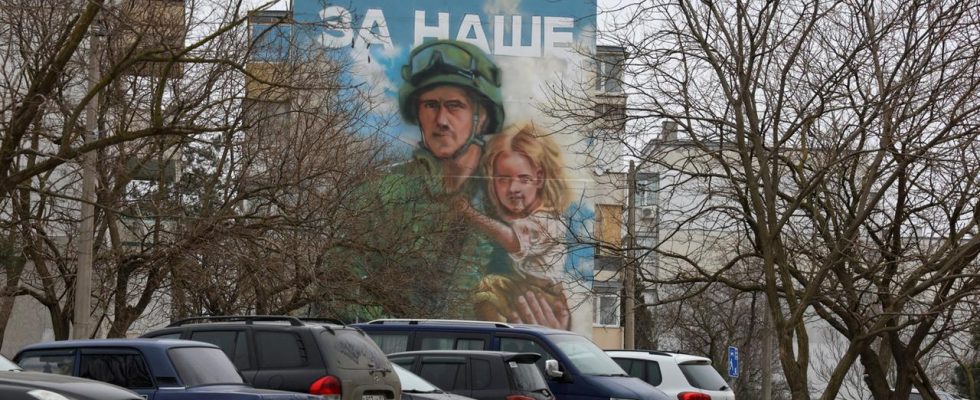When the Russian occupiers came, many Ukrainians were faced with the choice: leave – or stay and come to terms with the Russians. Many left their homes, but some joined forces with the attackers.
Dmitrij Novitsky works in a plain basement. He is a police officer in Kupyansk in eastern Ukraine. Together with his colleagues, he solves crimes, investigates rocket strikes and tries to prevent looting. But one task is particularly important for Novitsky: finding collaborators.
“We know that there are still many collaborators here. Some have gone to Western Ukraine or other regions. We are working on it – and our workforce has also been renewed. Young colleagues from other areas, we are capable of working. As long as the opportunities exist “We are investigating this area. Sooner or later everyone will have to answer for their actions,” says Novitsky.
Kupyansk is only a few kilometers from the front. The city was under Russian occupation for six months, then Ukrainian troops were able to retake it. Even with Dmitry Novitsky’s help. The police officer collected important information for the Ukrainian troops – a life-threatening task.
“There were many collaborators among my colleagues. They switched sides and began to betray us,” says the police officer. “They knew where we live, our information, where we are, what cars we drive. They showed the Russians who and where to look.”
Common cause with the enemy
Kupyansk is not an isolated case. The war against Ukraine is also a story of collaboration. The Kherson case in the south of the country is particularly well known. Some of them were officials from the domestic secret service SBU who are suspected of having worked for Russia and thus enabled the attackers to advance quickly.
Today, Ukraine is hunting down collaborators in the liberated areas – and has a problem, explains Oleksandr Pavlitschenko from the Helsinki Group for Human Rights: “Practice shows: the biggest collaborators are fleeing. So those who hold leading positions in the administration, the police, the judiciary or education.” Pavlichenko explains that they would go to Russia and receive large sums of money and apartments there. It would then no longer be possible to arrest them. “Little followers remain. Their role and the extent of the crimes are insignificant, but of course they supported this regime.”
Hatched: territories occupied by Russia
“Deep in their hearts they are waiting for the Russians”
In his office in Izyum, eastern Ukraine, local journalist Kostiantyn Hryhorenko shows the latest issue of his newspaper. Trials against collaborators are an important issue for Hryhorenko. He fled from the Russian troops because he feared for his life as a journalist.
The occupation has left its mark on the city to this day, says Hryhorenko: “A rift arose between the people who were under the occupation and those who returned afterwards. And it still exists today. I know a lot of people who collaborated and worked with the occupiers. I don’t trust these people. They are still in the city, walking freely on the streets. And they haven’t changed their attitude.”
Mutual mistrust and accusations characterize the areas liberated from Russian rule. Many returnees suspect those who stayed of collaborating. The other way around is: Anyone who has not experienced the occupation should not form an opinion about how they managed to survive. The mayor of Izyum also fled from the Russian troops – which is why some call him a traitor.
Valeriy Marchenko cannot trust a part of the population, he says: “No. There is a part of the people who collaborated. We were occupied for almost six months and they collaborated with the Russians. I think they are still waiting for theirs Return.” People behaved differently now so that they don’t get into problems. They are now positioning themselves for Ukraine and supporting its armed forces, says the mayor. “But I think deep in their hearts they are waiting for the Russians.”
From helper to defendant
As early as March 2022 – just a few weeks after the start of the Russian war of aggression – the Ukrainian government passed a law to prosecute collaborators. But that is far too broad, criticize human rights activists like Oleksandr Pavlitschenko. Therefore it is a problem for judges.
Pavlitchenko gives an example from an occupied village in the Kherson region in southern Ukraine: “People still live in the village and the occupiers bring humanitarian aid, food and hygiene products. They don’t go door to door and distribute the food, but ask for it Administration of the village. They are given the name of a woman who used to be on the village council. The food is given to her and she distributes it to the villagers.”
According to Ukrainian law, the woman could be charged with collaborating with the occupying regime. The approach is met with criticism.
No other choice
Change of scene: A littered apartment in a multi-story building in Izjum. Serhii Krivorotov lives here. During the occupation, he worked at the post office – established by the Russian security services. “If people hadn’t worked…” Krivorotov begins. “We weren’t the only ones. We didn’t just want to make money, we live here. Where should all the garbage go? It attracts rats and they come into the houses and basements.”
Whether it’s the post office, garbage collection or school – anyone who worked under the occupation regime is a suspect for journalist Kostjantyn Hryhorenko. The distrust among each other is still great today. Only time and fair legislation can help overcome the trauma, says Mayor Marchenko.
Rebecca Barth, ARD Kiev, tagesschau, February 19, 2024 12:16 a.m

